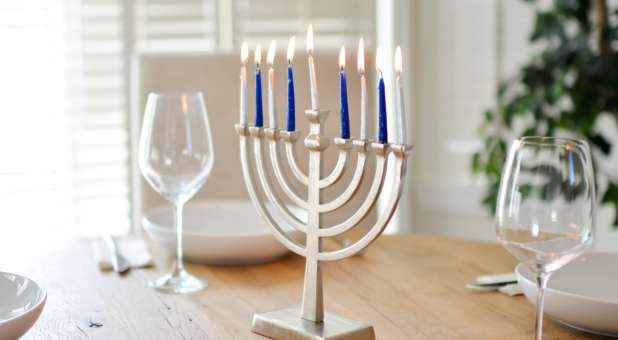Our Jewish friends get a head start on us Christians in celebrating at this significant season.
Several weeks before we Christians celebrate the birth of our Savior, Jesus of Nazareth, Jews celebrate an eight-day feast called in Hebrew “Hanukkah,” which in English is known as “the Feast of Lights or Dedication.”
Jewish celebrations follow the lunar calendar and specific, seasonal celebrations move around. This year, Hanukkah began Sunday evening, Dec. 2, which was also this year’s first Sunday of the Christian celebration of Advent, pointing us to the birth of Jesus, the Jewish Messiah and our Savior.
Gentiles are generally unfamiliar with Hanukkah. Primarily, this is because Hanukkah is an “additional observance” from the religious holidays actually mentioned in the Old Covenant. Instead, it flows from Jewish history and tradition.
Without a biblical basis, it was celebrated as a minor holiday, much like we celebrate Thanksgiving, acknowledging its purpose or debating its history but focusing on the joys of feasting in a family setting.
Today, many reformed or secular Jews celebrate Hanukkah more lavishly, somewhat like a Jewish Christmas. Some Jewish families, especially those with children in the home, even have a “Hanukkah tree” and exchange “Hanukkah cards” and gifts of the season, in kind of a modern, secular “festival of delights.”
Hanukkah is to remind Jews of the victory God gave to Jewish freedom fighters, the Maccabees, in 139 B.C. They revolted and threw off the evil oppression of the pagan Greco-Seleucid empire, which had desecrated the Jewish temple.
The Maccabees rededicated the temple and restored true temple worship. While their priests secured and sanctified new oil to rededicate their sacred temple, the menorahs burned miraculously for eight days, despite having only enough oil for a single day. This lighting and rededication are the backdrop to the Feast of Dedication or Hanukkah.
It is not surprising, then, that Jesus, a Jew, celebrated this wintertime rededication-memorial, as recorded in John 10:22-30. From these verses, which are the only occasion for the mention of this Jewish celebration in the New Testament, we can discern a significant Hanukkah message from Jesus at this Christmas season.
The Savior From God
The Gospel writer John tells us that many Jews questioned Jesus if He was the Messiah (10:24), the long-awaited Savior from God. It was a timely question: “How long will You keep us in suspense? If You are the Christ (Messiah), tell us plainly” (vv. 22-24).
Yet, Jesus (whose Hebrew name was Yeshua, meaning “Salvation”) did little to satisfy their human expectation for a political warrior to lead them.
His answer was simple: “I told you, and you did not believe. The works that I do in My Father’s name bear witness of Me. But you do not believe, because you are not of My sheep, as I said to you” (John 10:25-26).
Jesus’ critics challenged His miracle ministry (John 5:16-18), His integrity (7:12), His paternity (8:41) and His spiritual purity (8:48). So Jesus wisely responded, “I’ve already told you.” In both word and deed, He had already repeatedly answered their question (John 8:58, 10:25).
More than a mere, temporal solution, for which the Jews desired, God provided the eternal salvation, for which all mankind needs. The Maccabean victory, cleansing and rededication of the temple were short-lived.
But Jesus’ death, burial and resurrection would rescue our “desecrated temple” and restore us so we might walk in continued, eternal fellowship with Father God.
The Shepherd for God
Jesus continued His Messianic teaching by using the familiar allusion to a shepherd (John 10:27-28). He said that His sheep will recognize Him and respond to Him, in obedience: “My sheep hear My voice, and I know them, and they follow Me. I give them eternal life. They shall never perish, nor shall anyone snatch them from My hand.”
Earlier, in verse 16, Jesus told His disciples that He had “other sheep who are not of this fold.” This anticipated the mission His disciples would undertake after His resurrection and empowerment by the Holy Spirit, which eventually included the Gentiles and their incorporation into the one “sheepfold” of God.
Jesus of Nazareth, the Jewish Messiah and the Gentile’s Savior, is the great Shepherd of Father God’s one flock!
The Son of God
Jesus concluded His Hanukkah message by declaring that He is one with Father God and is His Son. In John 10:29-30 He said, “My Father, who has given them to Me, is greater than all. No one is able to snatch them from My Father’s hand. My Father and I are one.”
Yeshua’s statement, that He is one with the Father, is meant to give assurance to His followers. Frustration is found in measuring our lives by our problems, rather than by the greatness of our God.
Despite temporary trials, there is the ultimate victory in Jesus, the Messiah, the Son of God. As such, the Messiah demands a greater loyalty than the Maccabees, because He provides greater security.
This Christmas and Hanukkah season, I invite you to trust in Jesus (Yeshua) as Savior, Shepherd and Son. Following Him brings us the victory, in this life and the eternal life to come. {eoa}
Ordained to the ministry in 1969, Gary Curtis is a graduate of LIFE Bible College at Los Angeles (soon to become Life Pacific University at San Dimas, California). He has taken graduate courses at Trinity College in Deerfield, Illinois and Fuller Seminary in Pasadena, California. Gary served as part of the pastoral staff of The Church on The Way, the First Foursquare Church of Van Nuys, California, for 27 years (1988-2015), the last 13 years as the vice president of Life on The Way Communications Inc., the church’s not-for-profit media outreach. Now retired, Gary and his wife have been married for 50 years and live in Southern California. They have two married daughters and five grandchildren.














































